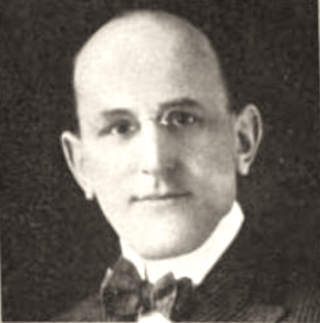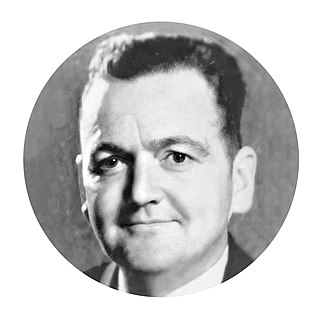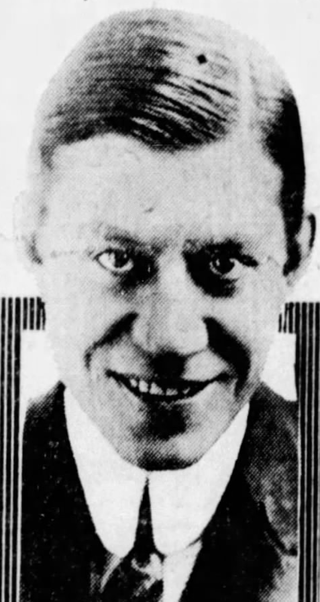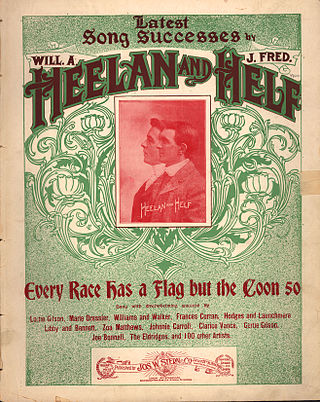This is a list of notable events in music that took place in the year 1907.
This is a nearly comprehensive list of notable events in music that took place in the year 1900.

Joseph Francis Lamb was an American composer of ragtime music. Lamb, of Irish descent, was the only non-African American of the "Big Three" composers of classical ragtime, the other two being Scott Joplin and James Scott. The ragtime of Joseph Lamb ranges from standard popular fare to complex and highly engaging. His use of long phrases was influenced by classical works he had learned from his sister and others while growing up, but his sense of structure was potentially derived from his study of Joplin's piano rags. By the time he added some polish to his later works in the 1950s, Lamb had mastered the classic rag genre in a way that almost no other composer was able to approach at that time, and continued to play it passably as well, as evidenced by at least two separate recordings done in his home, as well as a few recorded interviews.

Fred Fisher was a German-born American songwriter and Tin Pan Alley music publisher.

Alfred Bryan was a Canadian lyricist.

"Auld Lang Syne" is a Scottish song. In the English-speaking world, it is traditionally sung to bid farewell to the old year at the stroke of midnight on New Year's Eve/Hogmanay. By extension, it is also often heard at funerals, graduations, and as a farewell or ending to other occasions; for instance, many branches of the Scouting movement use it to close jamborees and other functions.

Howard Johnson was a song lyricist. He was inducted into the Songwriters Hall of Fame in 1970.

Jack Selig Yellen was an American lyricist and screenwriter. He is best remembered for writing the lyrics to the songs "Happy Days Are Here Again", which was used by Franklin Roosevelt as the theme song for his successful 1932 presidential campaign, and "Ain't She Sweet", a Tin Pan Alley standard.
Kerry Mills(néFrederick Allen Mills; 1 February 1869 in Philadelphia – 5 December 1948 in Hawthorne, California), publishing also as F.A. Mills, was an American ragtime composer and music publishing executive of popular music during the Tin Pan Alley era. His stylistically diverse music ranged from ragtime through cakewalk to marches. He was most prolific between 1895 and 1918.

Egbert Anson Van Alstyne was an American songwriter and pianist. Van Alstyne was the composer of a number of popular and ragtime tunes of the early 20th century.

"You're a Grand Old Flag" is an American patriotic march. The song, a spirited march written by George M. Cohan, is a tribute to the U.S. flag. In addition to obvious references to the flag, it incorporates snippets of other popular songs, including one of his own. Cohan wrote it in 1906 for his stage musical George Washington, Jr.

"Home! Sweet Home!" is a song adapted from American actor and dramatist John Howard Payne's 1823 opera Clari, or the Maid of Milan. The song's melody was composed by Englishman Sir Henry Bishop with lyrics by Payne. Bishop had earlier published a more elaborate version of this melody, naming it "A Sicilian Air", but he later confessed to having written it himself.

"Annie Lisle" is an 1857 ballad by Boston, Massachusetts songwriter H. S. Thompson, first published by Moulton & Clark of Newburyport, Massachusetts, and later by Oliver Ditson & Co. It is about the death of a young maiden, by what some have speculated to be tuberculosis. However, the lyric does not explicitly mention tuberculosis, or "consumption" as it was called then. The song might have slipped into obscurity had the tune not been adopted by countless colleges, universities, and high schools worldwide as their respective alma mater songs.

Sam M. Lewis was an American singer and lyricist.
Louis Achille Hirsch, also known as Louis A. Hirsch and Lou Hirsch, was an American composer of songs and musicals in the early 20th century.
William A. Heelan was an American lyricist during the early 20th century. He collaborated with a number of composers and lyricists including E. P. Moran, Seymour Furth, J. Fred Helf and Harry Von Tilzer.

Coon songs were a genre of music that presented a stereotype of Black people. They were popular in the United States and Australia from around 1880 to 1920, though the earliest such songs date from minstrel shows as far back as 1848, when they were not yet identified with "coon" epithet. The genre became extremely popular, with White and Black men giving performances in blackface and making recordings. Women known as coon shouters also gained popularity in the genre.

"Every Race Has a Flag but the Coon" was a song written by Will A. Heelan, and J. Fred Helf that was popular in the United States and the United Kingdom. The song followed the previous success of "All Coons Look Alike to Me", written in 1896 by Ernest Hogan. H. L. Mencken cites it as being one of the three coon songs that "firmly established the term coon in the American vocabulary".

"Red Wing" is a popular song written in 1907 with music by F.A Mills and lyrics by Thurland Chattaway. Mills adapted the music of the verse from Robert Schumann's piano composition "The Happy Farmer, Returning From Work" from his 1848 Album for the Young, Opus 68. The song tells of a young Indian girl's loss of her sweetheart who has died in battle.
"Old Nassau" has been Princeton University's alma mater since 1859. Harlan Page Peck was the lyricist and Carl A. Langlotz was the composer. The lyrics were changed in 1987 to address sexism at the newly co-educational institution. For a brief time the song was sung to the melody of "Auld Lang Syne" before Langlotz wrote the music on demand. The lyrics were the result of a songwriting contest by the Nassau Literary Review.














